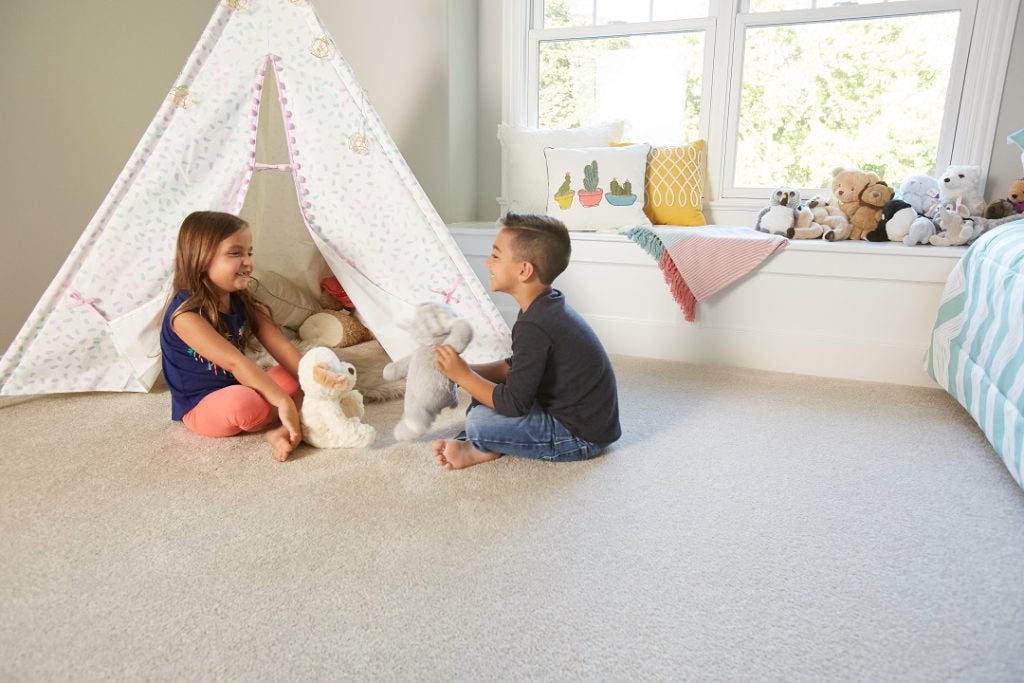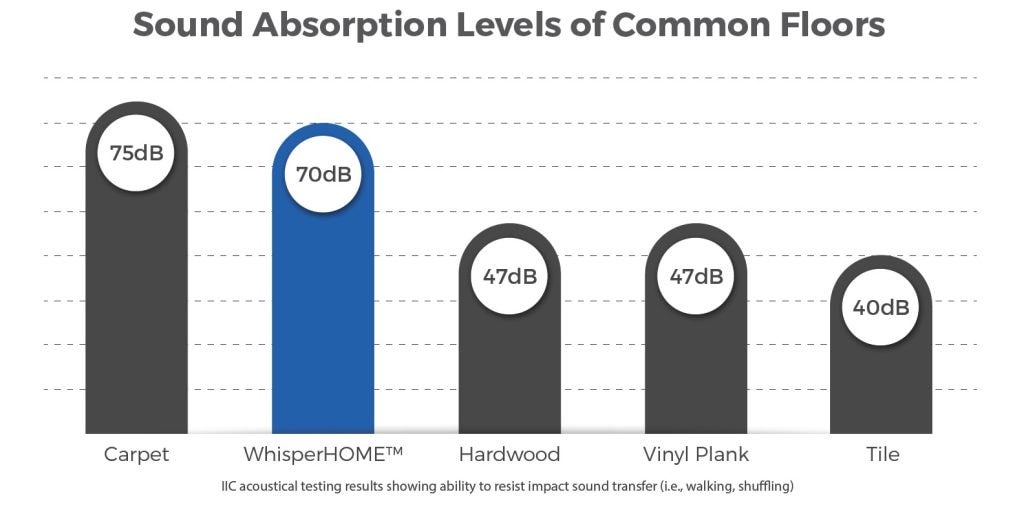When it comes to buying new flooring, many shoppers are driven by comfort. But one aspect that’s rarely considered as part of the overall comfort of your home is the noise level. As the largest continuous surfaces in a home, your floors can contribute greatly to how sound travels within a particular room, into other rooms, and between levels of your home. Here’s how picking the right floor can make your home a calmer, quieter space, especially in a home with pets or active children.
While you don’t need to be an acoustical engineer to understand the benefits of particular surfaces and their influence on noise levels, a basic background on how sound travels will help illustrate why certain rooms can “feel” much louder than others. Sound travels in waves of energy which, like a tennis ball, bounce off of hard, flat surfaces with predictable strength and direction. Throw it straight down at a concrete driveway, and it will bounce straight back up with nearly as much force as you used to throw it.
But try to bounce it on a lush lawn, and it will either simply stop with a thud in the grass, or bounce a tiny bit in an unpredictable direction. In short, the harder a surface is, the more easily a soundwave will bounce off of it. A bounced sound wave becomes an echo and contributes to a louder sounding room. But soft materials greatly cut down on the reflection of sound waves by absorbing the energy or scattering it in many different directions at once.
From that very brief science lesson, you might guess that a carpeted room will sound quieter than a room finished in ceramic tile or real hardwood floors—and you’d be correct. A fully carpeted floor can help reduce ambient noise levels by upwards of 20 decibels compared to tile or vinyl floors. That can mean the difference between being able to hear someone who is in the same room whisper vs them needing to speak loudly. In general, the thicker and more dense the carpet, the better its sound-reducing characteristics will be. So, you can usually expect a frieze or plush carpet to be a more sound dampening floor that a pattern or Berber carpet.

Another factor to consider is what type of carpet padding is used. Based on the same scientific principles as before, the thicker and denser the carpet padding is, the better its noise reduction properties will be. And here’s where auditory and tactile comfort converge: those thicker and denser carpet pads will also be more comfortable to walk on. This combination makes carpet the ideal flooring for gathering areas like the den or a dedicated playroom. After all, the benefits of having an isolated home office or a dedicated playroom for the kids aren’t as great if noise still becomes a distraction.
It’s also a smart choice for kids’ bedrooms that are on the upper level of a home, as the noise-insulating properties of carpet will help keep more of the ruckus from coming through the floor and reaching the rest of the home. This is one of the main reasons that many multi-level buildings in major cities have an “80% carpet rule,” which stipulates that the majority of hard floors should be covered by rugs or carpet in order to help isolate noise within a unit.
But even with the practical noise-reducing properties of carpet, for many people, carpet simply will not fit into a décor scheme. And even if a quieter home is a high priority. Recent industry surveys have shown that if homeowners could choose their “dream floors,” they would overwhelmingly opt for hardwood flooring. So what can those shoppers do if they’re caught between their desire for a quieter home and the floors of their dreams, which are made from wood—a notoriously “noisy” floor material? That’s where WhisperHome® from Empire Today® comes in.
WhisperHome® is an engineered hardwood flooring material that has been specifically optimized to prioritize quietness. In a typical use case, a WhisperHome® sound dampening floor can absorb almost as much noise energy as a carpeted floor. That means much less of the clacking and tapping that often comes from typical foot traffic on a genuine hardwood floor.

And because WhisperHome® is an engineered flooring material, you still get many of the benefits of genuine hardwood floors: the real wood top surface with its truly unique grain patterns, and the ability to be refinished one or more times in its lifespan.
There are, of course, other variables to consider when shopping for new floors if controlling noise levels is a high priority. The type of subfloor already installed in your home and the multiple types of available underlayment materials can help create a more sound dampening floor. With all of the options to consider, it can be nearly impossible to come to any solid decision on your own. And that’s why the Empire® In-Home Shopping Experience can be so valuable. Being able to see and feel hundreds of samples of carpet or other flooring types while picking the brain of a season flooring professional—all in the comfort of your own home—takes all of the guesswork out of buying new floors. Click the link or give us a call to set yours up today and you’ll be enjoying the benefits of sound dampening floors in no time.
Get the latest updates delivered to your inbox.